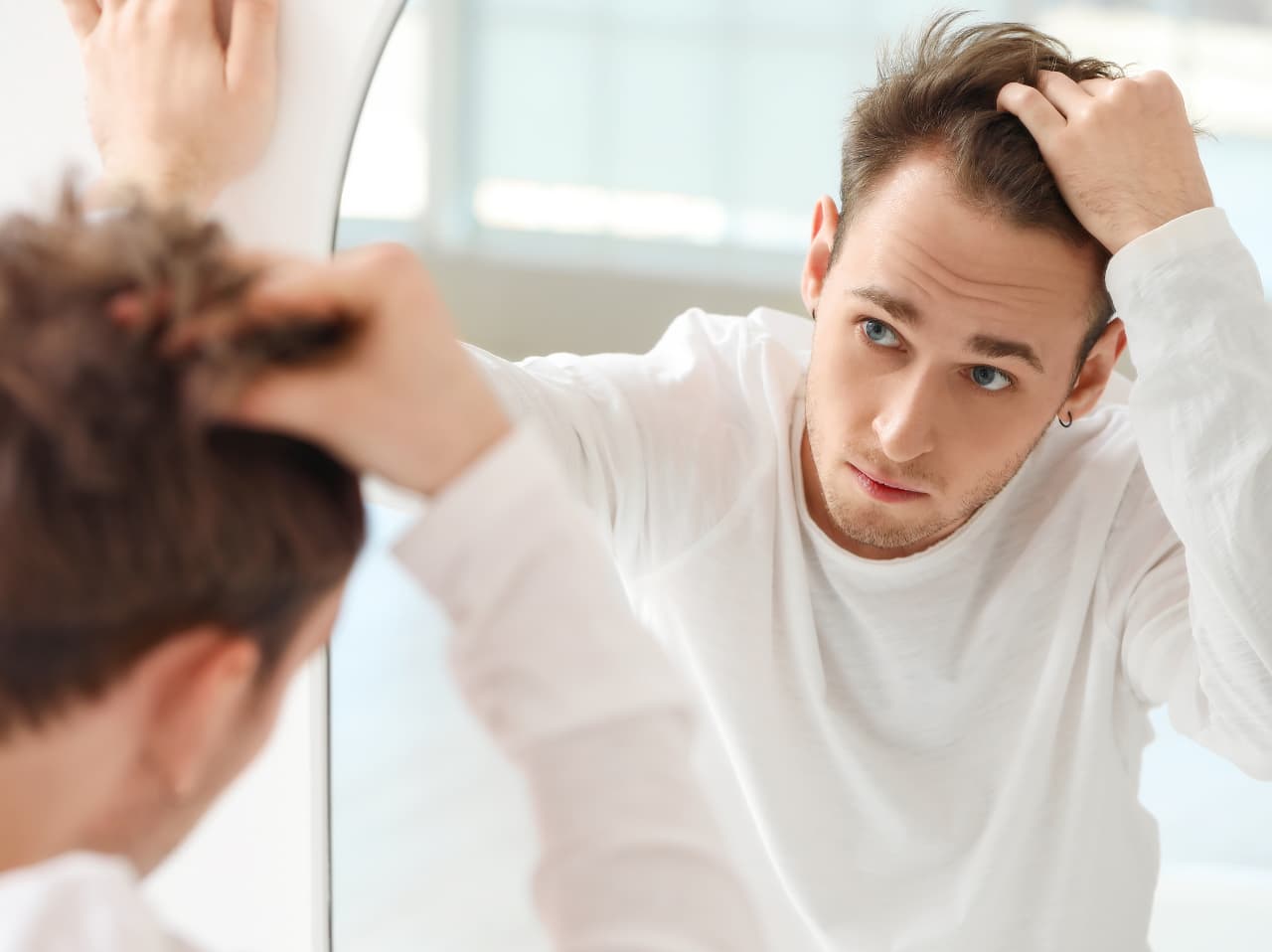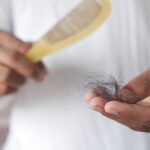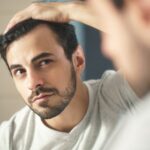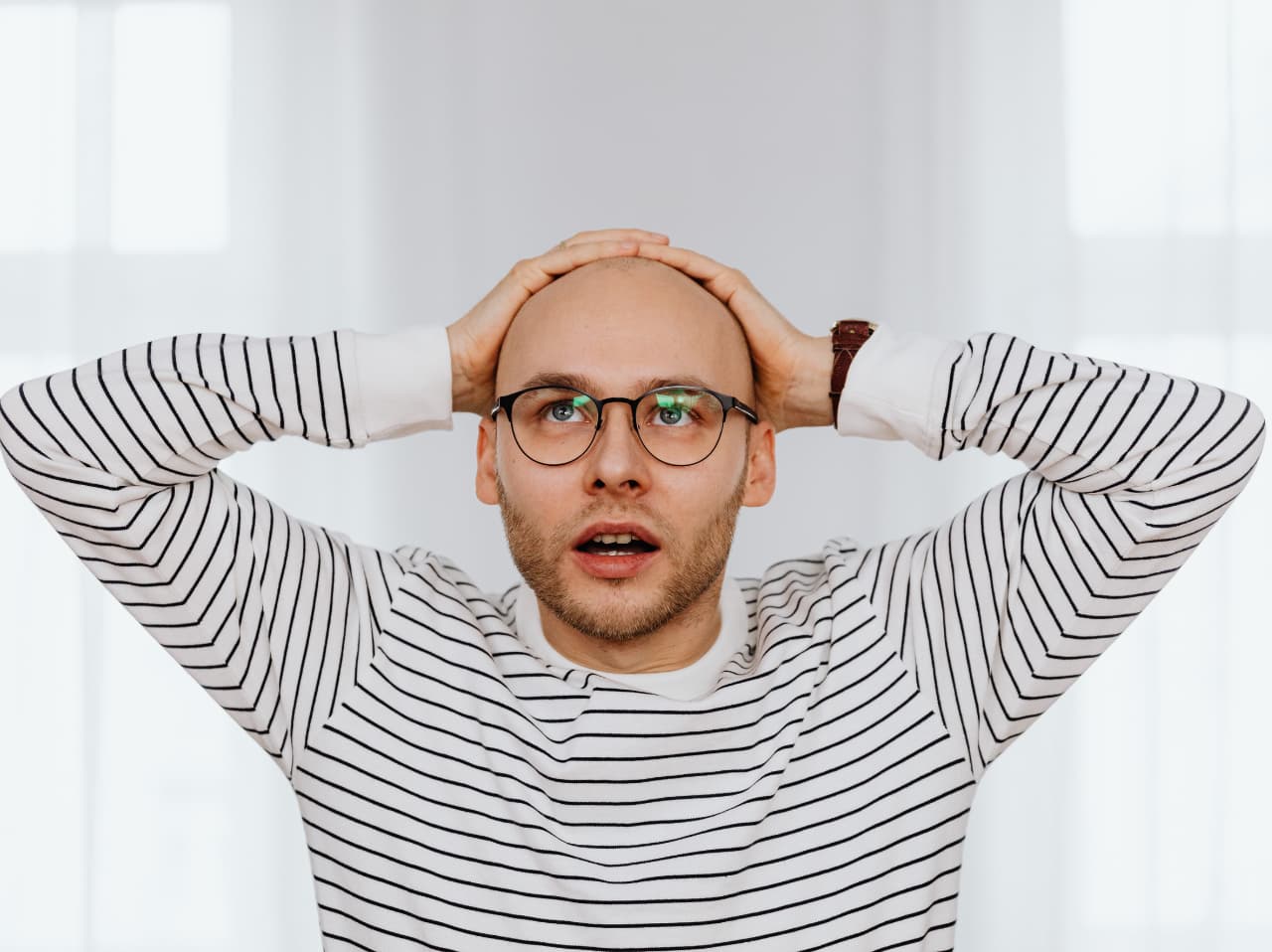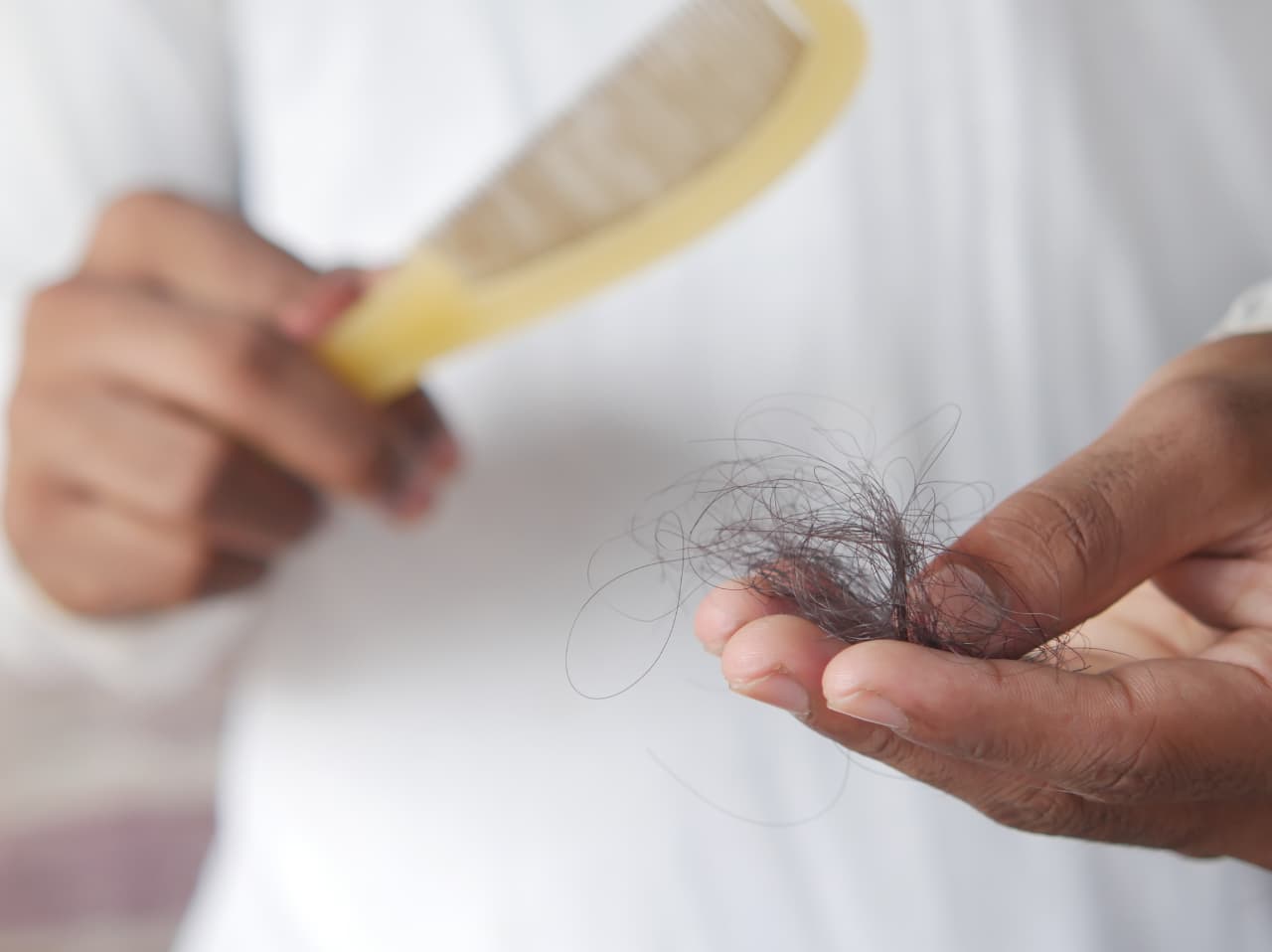Table of Contents
ToggleIron supplements for hair loss can restore strength and promote regrowth by improving oxygen delivery to hair follicles. Low iron levels reduce the body’s ability to nourish the scalp, weakening strands and triggering shedding.
Iron supports hemoglobin production the protein that carries oxygen to your scalp and follicles. When iron levels drop, follicles receive less oxygen and nutrients, causing premature hair shedding known as telogen effluvium.
At Kopelman Hair, doctors often identify iron deficiency as a key contributor to diffuse thinning, especially in women. Correcting low iron levels helps reactivate dormant follicles and improve scalp circulation for steady, healthy growth.
Key Takeaways
- The best iron supplement for hair loss depends on your body’s absorption rate and medical needs.
- Iron deficiency can cause shedding by limiting oxygen to follicles.
- Restoring ferritin levels supports stronger, thicker regrowth.
- Combining iron with nutrients like vitamin C, biotin, and zinc enhances results.
- Medical supervision ensures safe, effective supplementation and long-term improvement.
How Iron Affects Hair Health
Iron plays a crucial role in cellular energy and follicle nourishment. It enables the production of hemoglobin, ensuring oxygen and nutrients reach scalp tissues efficiently. When iron stores run low, follicles receive less oxygen, weaken, and shed early. Over time, this deficiency can cause diffuse thinning or visible scalp patches.
Low ferritin levels particularly link to hair loss because ferritin stores iron for future use. When these reserves fall below optimal range, follicles lack the support needed to sustain healthy growth cycles. Correcting ferritin levels allows follicles to return to their active growth phase and prevents premature shedding.
Maintaining balanced iron levels also helps protect keratin structure — the main protein in hair strands keeping them resilient against breakage.
Can Iron Deficiency Lead to Hair Loss?
Yes. When iron is scarce, your body redirects oxygen to essential organs instead of hair production. This shift reduces energy available for follicles, leading to thinner strands and ongoing shedding.
Typical signs of deficiency include fatigue, brittle nails, pale skin, and persistent hair fall. Some individuals may also experience dizziness or cold extremities. A simple blood test can confirm low ferritin — the clearest marker of iron-related hair loss.
Addressing the deficiency early not only restores hair density but also improves overall vitality. Left untreated, chronic deficiency can prolong the resting phase of follicles and cause widespread thinning.
Best Iron Supplements for Hair Loss
Not all iron supplements are equally effective. Choosing the right one depends on individual absorption, digestive tolerance, and medical guidance.
Common Options
- Ferrous sulfate: The most widely used and clinically studied form, known for strong absorption.
- Ferrous gluconate: Gentler on the stomach, suitable for long-term use.
- Heme iron polypeptide: Derived from animal sources and ideal for patients with sensitive digestion or poor absorption.
Dr. Ross Kopelman advises that supplementation should always follow lab testing and medical consultation. Excess iron can accumulate in organs and disrupt mineral balance, making professional monitoring essential.
A customized dosage plan ensures optimal results while minimizing side effects such as nausea or constipation.
How Long Does It Take for Iron to Improve Hair Growth?
Hair regrowth requires patience and consistency. Most patients notice visible improvement within three to six months of sustained supplementation.
As iron stores build, blood flow to the scalp increases, reviving dormant follicles. Pairing iron with vitamin C improves absorption and supports collagen synthesis around the follicle base. Conversely, tea, coffee, and dairy should be avoided near supplement time because they reduce absorption efficiency.
Improvement timelines vary depending on how long the deficiency existed and whether other factors such as hormonal imbalance or stress also contribute to hair loss.
The Role of Ferritin in Hair Regrowth
Ferritin acts as the body’s storage system for iron, regulating supply to cells, including follicles. Even when blood iron levels appear normal, low ferritin can still trigger shedding.
At Kopelman Hair, specialists evaluate ferritin during every diagnostic workup for unexplained thinning. Optimal ferritin levels allow follicles to receive consistent oxygen flow, which supports new hair formation and strengthens regrowing strands.
Maintaining ferritin levels above 70 ng/mL is often associated with better regrowth outcomes, particularly in women experiencing diffuse hair loss.
Combining Iron with Other Hair Growth Supplements
ron works synergistically with other nutrients that promote follicle vitality and scalp balance. Combining supplements ensures a multi-dimensional approach to regrowth.
Effective Combinations
- Iron + Vitamin C: Enhances absorption and increases oxygenation.
- Iron + Zinc: Strengthens the hair shaft and improves follicle resilience.
- Iron + Biotin: Encourages keratin production and restores hair texture.
This combination fosters optimal scalp health and thicker, shinier strands. A medically guided supplement plan ensures safe dosing and steady improvement.
Hair Vitamins That Support Iron Therapy
While iron fuels follicle activity, other vitamins maintain scalp circulation and cellular health.
Key Vitamins
- Vitamin D: Encourages follicle cycling and stimulates dormant roots.
- Vitamin B12: Assists in red blood cell production and enhances oxygen transport.
- Vitamin E: Improves circulation and reduces oxidative stress around follicles.
Dr. Ross Kopelman often recommends a comprehensive, evidence-based plan that pairs these vitamins with iron for consistent, safe recovery.
Dietary Sources of Iron for Hair Health
Food remains the most sustainable way to preserve healthy iron levels. Combining both heme and non-heme sources creates balance and reduces the need for long-term supplementation.
Iron-Rich Foods
- Lean red meat and poultry
- Fish and shellfish
- Spinach, lentils, and kale
- Fortified cereals and beans
Pairing plant-based iron with vitamin C–rich foods like citrus or bell peppers boosts absorption. Maintaining a nutrient-dense diet also supports overall scalp health and reduces inflammation linked to shedding.
Understanding the Connection Between Iron and Hormonal Hair Loss
Iron deficiency can aggravate other forms of thinning, including female pattern hair loss and postpartum shedding. Hormonal fluctuations make follicles more sensitive to stress and nutritional deficits.
Replenishing iron helps stabilize scalp function, calm inflammation, and enhance response to hormonal or medical hair treatments. Balanced iron stores support stronger regrowth and prevent future breakage.
Restoring iron also supports thyroid function and red blood cell health, two critical systems often linked to hair thinning in women.
When to Consider a Medical Evaluation
If you experience persistent shedding, scalp tenderness, or fatigue, schedule a medical assessment. A ferritin test and full blood panel help confirm whether your body lacks stored iron.
At Kopelman Hair, specialists combine scalp imaging and blood testing to identify root causes, whether nutritional, hormonal, or inflammatory. With these results, Dr. Ross Kopelman develops a precise plan that safely corrects deficiencies while protecting scalp integrity.
Medical evaluation ensures that supplements, diet, and treatments align with your specific physiology, maximizing success and preventing side effects.
How Iron Deficiency Affects Men and Women Differently
Women are more likely to develop deficiency as a result of menstruation and pregnancy, while men tend to lose iron more slowly.
For women, thinning appears evenly across the scalp, while men typically experience loss at the crown or hairline. Iron therapy, paired with supportive nutrition and vitamins, benefits both groups by reactivating follicles and promoting thicker regrowth over several months.
Addressing deficiency also supports overall hormonal balance and energy levels, improving both health and hair vitality.
Risks of Taking Iron Without Guidance
Taking iron without professional oversight can cause digestive discomfort or, in severe cases, toxicity. Too much iron stresses the liver, heart, and pancreas, and may interfere with zinc and copper absorption.
Only supplement under medical supervision. Dosage should be based on verified blood results, not symptoms alone. Dr. Ross Kopelman emphasizes routine follow-ups and periodic testing to ensure ongoing safety and progress.
A balanced approach helps avoid complications and ensures the best possible outcome for both scalp health and overall wellness.
Lifestyle Tips to Support Hair Regrowth
Consistent care supports lasting improvement. Lifestyle changes work alongside supplements to create an optimal environment for growth.
- Eat balanced meals rich in protein, whole grains, and leafy greens.
- Manage stress through physical activity or meditation.
- Stay hydrated and prioritize quality sleep.
- Avoid restrictive diets that lower nutrient intake.
- Take supplements consistently as prescribed.
These habits enhance circulation, reduce inflammation, and strengthen follicles from within. Combined with medical treatment, they provide a sustainable foundation for long-term results.
Expert Perspective from Dr. Ross Kopelman
With more than forty years of medical expertise, Dr. Ross Kopelman explains that iron deficiency remains one of the most correctable causes of hair loss. Early identification and targeted treatment can prevent chronic thinning and restore confidence.
His approach combines laboratory testing, nutritional balance, and advanced therapies to rebuild scalp vitality. By focusing on cause-based solutions rather than temporary fixes, his patients achieve stronger, healthier hair that lasts.
Final Thoughts
Correcting iron deficiency can transform scalp health, rebuild strength, and restore natural density. When guided by medical expertise and consistent follow-up, supplementation promotes lasting improvement and prevents recurrence.
At Kopelman Hair, individualized treatment, evidence-based care, and continuous monitoring empower patients to achieve visible, natural results. With the right approach, even long-standing thinning can improve, bringing back healthy, resilient hair and renewed confidence.



